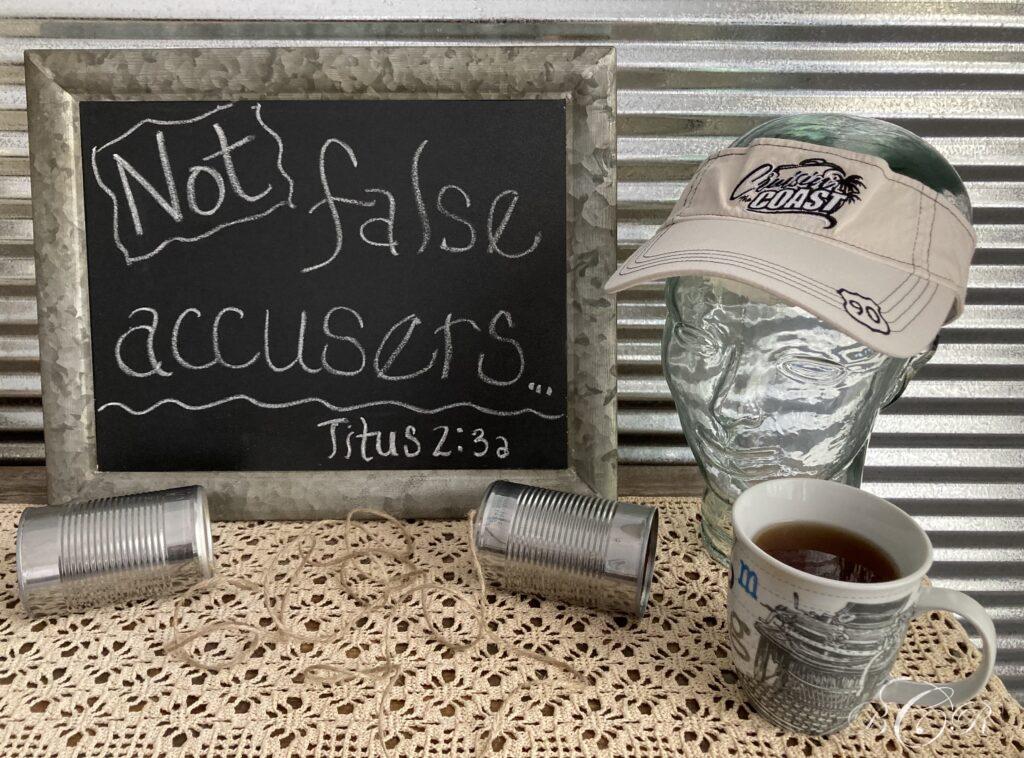“That the aged men be sober,
grave, temperate,
sound in faith, in charity, in patience
The aged women likewise.
that they be in behavior
as becometh holiness,
not false accusers,”
Titus 2:2a-3a
The old saying, “Sticks and stones may break your bones but words will never hurt you.” is a down-right lie. Words do hurt. Mean, thoughtless, unkind, words hurt bad, deep down, and for a long time. They break our hearts and play over and over again in our heads. They cause depression, despair and damage that can lead to brokenness and bitterness. This is especially true when the hurtful words come in the form of a false accusation. The Bible teaches that Christians are to be kind and honest (Ephesians 4:32 & Romans 12:17). False accusations are neither of those and are not “behavior that becometh holiness.” God’s Word makes it clear that falsely accusing others is a behavior to avoid.

I was stunned when I found out what “false accuser” means in the Titus 2 (and 2 Timothy 3:3). Notice who is mentioned in the definition:
False Accusers – Greek #1228 – diabolos
From G1225; a traducer; specifically Satan (compare [H7854]): –
To traduce, as defined in the Merriam Webster 2022 Online Dictionary, means:
“to expose to shame or blame
by means of falsehood and misrepresentation.”
Now, notice what the definitions for Satan show when you trace the words back to the primitive root in the Hebrew:
Hebrew #07854 – satan
from 7853; an opponent; especially (with the article prefixed) Satan, the arch-enemy of good:–
Hebrew #07853 satan,
a primitive root; to attack, (figuratively) accuse:–
(Strong’s Concordance)
Ouch! False accusers are categorized with Satan himself. That hurts to think about, even if we’ve done it unintentionally. Who wants to be associated with Satan? He is known for:
- Being an opponent
- Being an arch-enemy of good
- Attacking
- Accusing
I wish I could say that I’ve never shamed, falsely blamed, or misrepresented a living soul. Honestly, it’s never my intention. However, in my weak, selfish, hurt, and frustrated moments, I’ve thrown accusatory words out on others that they did not earn or deserve.
When we start blaming or placing fault on others, it is very important that we know for a fact that they have committed the offense. In most every situation, we should stop and remember that:
- We may not have heard things correctly
- We may not have all the facts
- We may not have accurate information
- We may not need to tell what we know
- We may be embellishing the story
- We may need to consider our sources
- We may need to check our own motives for sharing
- We may need to examine how we played a part
Wrongfully accusing someone can do more than offend them. It can ruin reputations in other people’s eyes. It can discredit their spiritual and social standings. It can hurt their careers or businesses. It can turn people against them. It can also turn others, who believed in and respected them as Christians or leaders, against God, the church, or their friends or family.
There is a great possibility, if we are of any age, that we’ve have either been falsely accused or have falsely accused someone we know. If we have, we know the pain and damage that can inflict. Today is a great day to stop the behavior, right the wrongs, and start to do better. God requests it of us.
Bring It Home
Have you ever been hurt by false accusations?
Praying for you as we grow together, Smiles, BRC


Good stuff here, friend! I read about false accuser and the root when I was studying another passage (which I can’t remember right now 😳). Absolutely convicting!!
Isn’t it a powerful, convicting truth Ellen? It helped me understand this topic better for sure.
Thanks for your reply.
🌻Smiles, BRC
This was right on time. ❤️
I’m sorry that we need reminded of this truth at any time Aly and we all avoided this behavior 24/7.
But, I love how God is always teaching us.
🌻Sigh, BRC